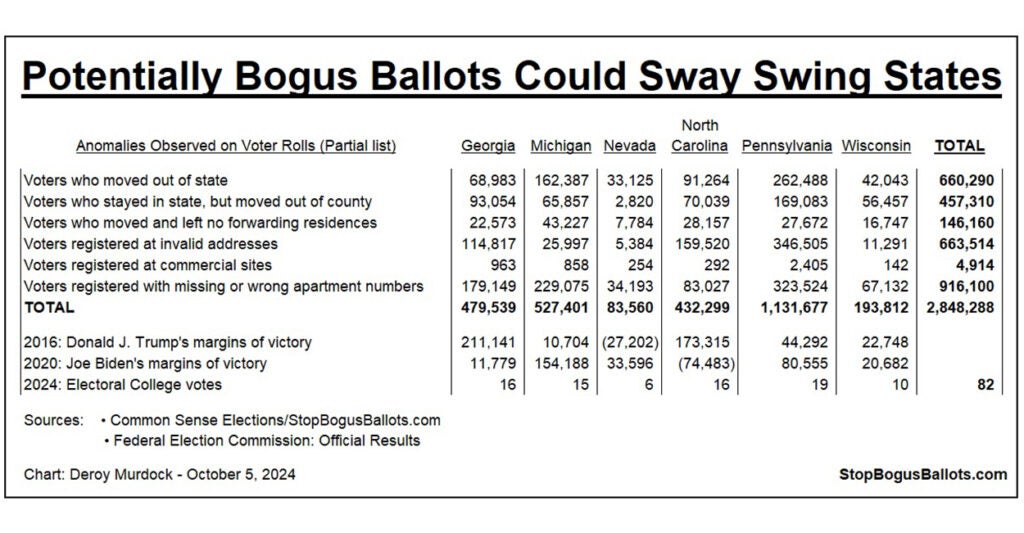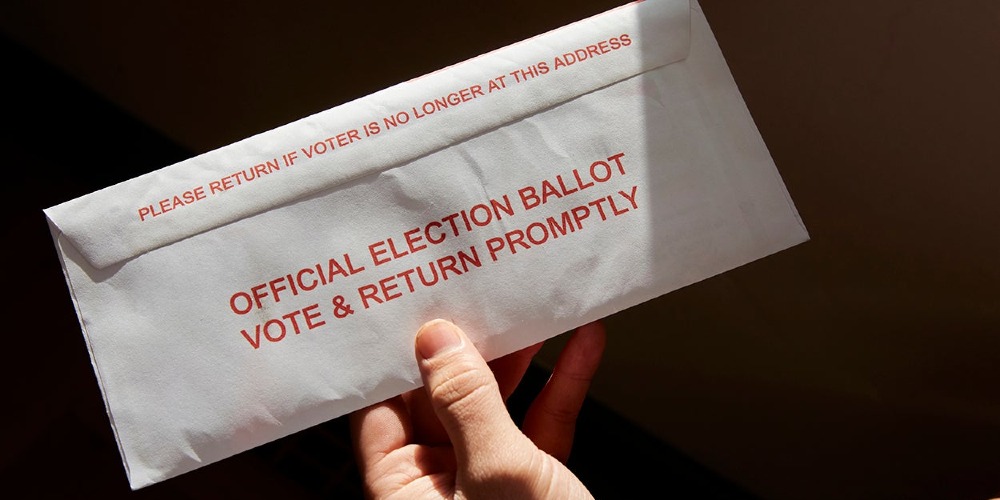(The Daily Signal)—Donald J. Trump is on a roll, but his campaign could get run over.
The GOP nominee is on message. He pledges to restore prosperity, retame inflation, reseal the border, refight crime, and resurrect global tranquility.
America was better off when Trump’s “Peace Through Strength” policy bolstered European harmony and catalyzed the Abraham Accords.
Under Kamala Harris’ “War Through Weakness” doctrine, Moscow’s bombs blast Kyiv and Tehran’s missiles rock Tel Aviv.
Trump running mate JD Vance’s commanding debate performance Oct. 1 dazzled voters and razzled his Democrat rival, Minnesota Gov. Tim “Knucklehead” Walz. Trump leads Harris in social media engagement, and the Republican ticket is rising in swing states.
But Trump’s progress could evaporate, thanks to a hazard as invisible—yet potentially lethal—as carbon monoxide.
This election could come down to one or two toss-up states captured by a relative handful of problematic mail-in ballots. Unlike normal ballots, which precinct workers personally hand to and collect from actual voters, mail-in ballots have zero chain of custody.
County clerks or independent printers haul truckloads of ballots to U.S. Postal Service facilities. Letter carriers deliver them as addressed.
Most of these ballots find actual voters, but others reach questionable or even unqualified locations, directed to phantom “voters” who have moved away, passed on, or never even existed.
Left-wing nongovernmental organizations, or NGOs, harvest, complete, and submit these ballots at election offices. They also deposit them in unsupervised drop boxes. This “one time only” measure—implemented during 2020’s COVID-19 horror—has become as unshakable as lampreys.
A smattering of such bogus ballots might be a minor nuisance. Unfortunately, their abundance could cost Trump the White House.
A new organization called Common Sense Elections harnesses robust fractal computing to reconcile voter rolls with property tax records, postal change-of-address forms, and other government databases.
Austin, Texas-based ballot security expert Jay Valentine launched Common Sense Elections to expose “addresses such as a Walmart, bank, 7-Eleven, or a college dorm room where the student graduated 12 years ago—all yielding ballots that NGOs gather and vote.” I am assisting this movement to stop bogus ballots.
What Common Sense Elections discovered in Georgia, Michigan, Nevada, North Carolina, Pennsylvania, and Wisconsin should trigger klaxons at Trump-Vance headquarters and the Republican National Committee. Here it is in chart form:

- Across these states, 660,290 mail-in ballots are tied to registered voters who permanently moved to other states. These absentees number 68,983 in Georgia (far exceeding Joe Biden’s 2020 margin of victory: 11,779 votes); 262,488 in Pennsylvania (which Biden won by 80,555); and 42,043 in Wisconsin (Biden’s by 20,682).
- Voters who moved to other in-state counties total 457,310. These include 65,857 relocated voters in Michigan (which Trump won in 2016 by 10,704 votes) and 169,083 in Pennsylvania (which Trump secured in 2016 with 44,292 votes).
- Voters who moved and left no forwarding residence total 146,160.
- Those linked to invalid addresses total 663,514. Pennsylvania is home to 346,505 such “voters.”
- Voters recorded as residing at commercial sites: 4,914. These reflect, among others, “voters” at Las Vegas’ Harry Reid International Airport and a vacant lot at 9145 Mann St., Las Vegas.
- A staggering 916,100 voters are enrolled with missing or incorrect apartment numbers. This boosts the odds that postal workers will leave unclaimed ballots in lobbies or mailrooms, where harvesters can retrieve and abuse them.
- All told, these screwy ballots total 2,848,288—in just these six states and involving only these six anomalies shown here. Deeper and wider scrutiny has yielded graver worries.
The good news is that Common Sense Elections’ technology identifies these suspicious destinations. It then asks county clerks not to send them mail-in ballots.
CSE also monitors ballots that are filled in and returned. It flags those that arrive from fishy addresses and advises election officials not to count them.
Those who insist on tabulating bogus ballots could face litigation.
Election integrity activists who inspected Wisconsin’s voter lists via Common Sense Elections sued Sept. 30 to require that Badger State election officials verify the registrations associated with 143,742 eyebrow-raising addresses.
Four days earlier, on Sept. 26, CSE’s allies sued Georgia Secretary of State Brad Raffensperger, a Republican, to address 162,037 registrants who seemingly switched counties or completely exited the Peach State. If so, the plaintiffs want such registrations declared inactive.
Through these and related efforts, Common Sense Elections hopes to make elections great again by rallying America around the battle cry of its website address: StopBogusBallots.com.
We publish a variety of perspectives. Nothing written here is to be construed as representing the views of The Daily Signal.


